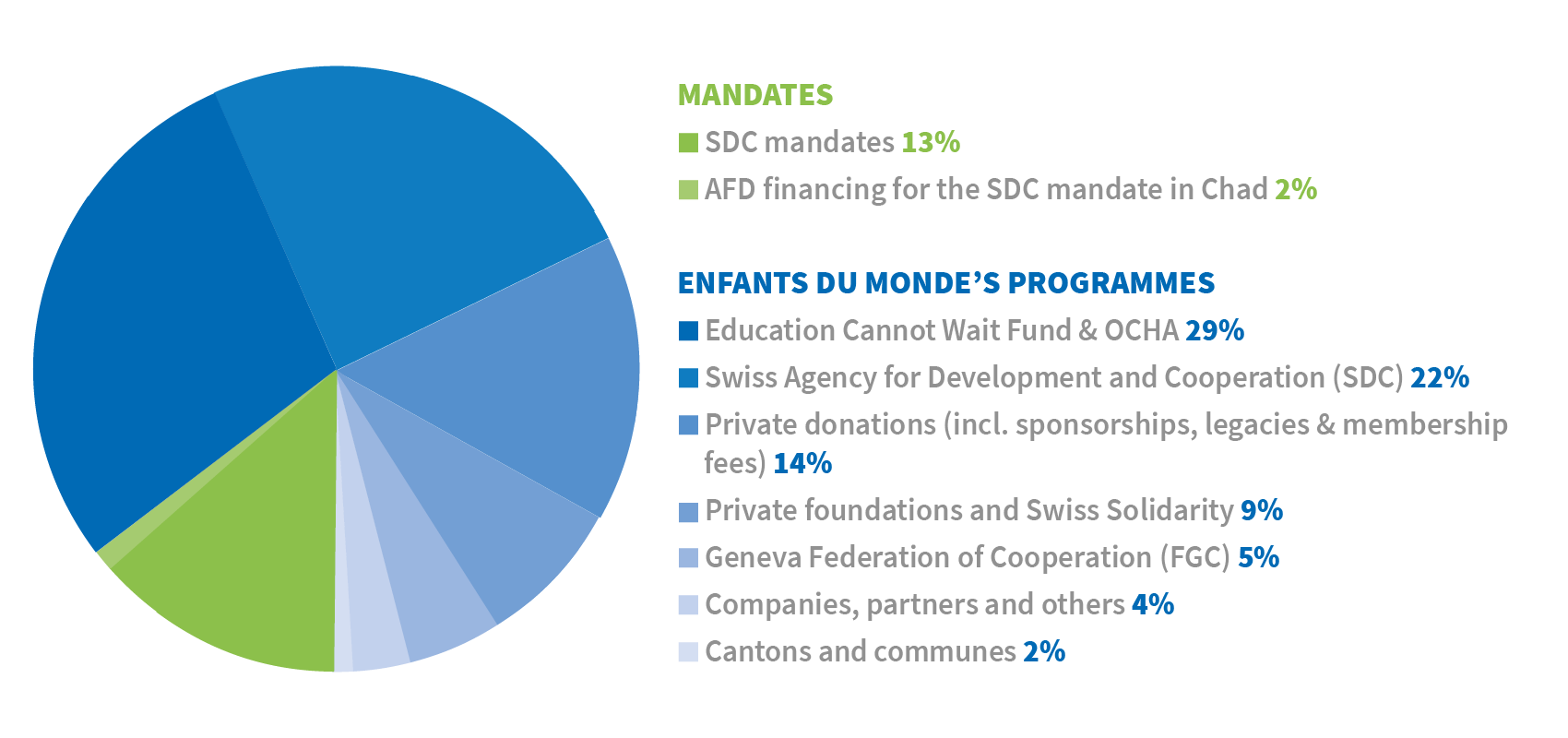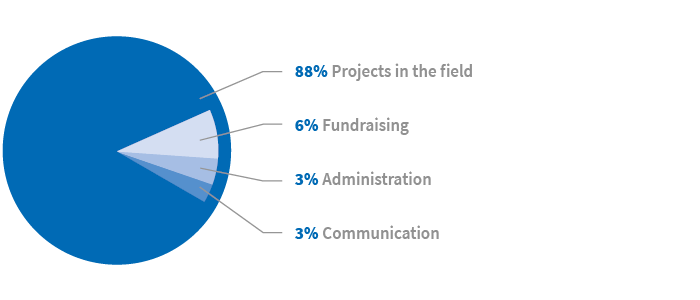frequently asked questions
General
Who is Enfants du Monde?
Enfants du Monde is a Swiss non governmental organisation (NGO), founded in 1968 and based in Geneva. The mission of Enfants du Monde is to help and protect disadvantaged children in poor countries by offering them a quality education and access to health services. The aim is to help local populations improve their living conditions and become more independent.
Enfants du Monde manages 15 projects in the priority fields of education, training and health in eight countries (Bangladesh, Burkina Faso, Madagascar, Guatemala, Tansania, Niger, Salvador). More than 89,900 children and their families benefit from these projects.
In Switzerland, Enfants du Monde raises the awareness of young people to the realities of life in developing countries.
How is Enfants du Monde different from other associations?
- In its education projects, Enfants du Monde places emphasis on the quality of the teaching not just on the number of schools and children taught.
- In its health projects, Enfants du Monde works in close collaboration with local populations and authorities, with the aim of establishing links and cooperation between health services, families and the community in order to reduce maternal and infant deaths and to improve the accessibility and quality of health care services.
- In its work, Enfants du Monde uses two proven innovative approaches: an active pedagogical approach developed by Enfants du Monde and the health approach entitled “Working with individuals, families and communities to improve maternal and newborn health” developed by the World Health Organisation.
- Enfants du Monde is committed to promoting long-term development and aims for sustainable independence of local populations.
- Enfants du Monde does not have expatriate staff. Enfants du Monde works closely with local partners and its three regional coordination offices are managed by local staff.
- Enfants du Monde offers not only financial but also technical support. The education and health specialists based in Geneva share their knowledge with the local partners. Their skills are then shared through training courses and local abilities are strengthened.
Support: donating, sponsoring, volunteering, etc.
How can I support Enfants du Monde?
There are several ways in which you can support Enfants du Monde:
- Make a donation, by credit card, paiement slips or direct debit
- Become a sponsor by choosing the programme, the amount and frequency of your support
- Become a member by annual subscription
- Make a bequest and help improve – tomorrow – the lives of disadvantaged children
- Volunteer: other ways to become involved, not just financially
Is it possible to do an internship at Enfants du Monde?
Yes, under the following conditions:
- Interns must commit to work for a minimum of 6 months;
- Interns must have a bachelor’s degree (or equivalent) and previous work experience;
- Internships may be paid or unpaid, depending on the position;
- The place of internship is Geneva (Switzerland);
- Enfants du Monde does not send interns on projects in the field.
All internship offers are posted on the Careers section of our website.
Why project sponsorship, rather than personal or individual sponsorship?
In order to guarantee lasting support and to help not just to one child, but many, and in conformity with Zewo, the Swiss seal of quality, Enfants du Monde suggests that donors who wish to give targeted aid can become project sponsors.
Indeed, as Zewo mentions in its fact sheet on the different types of sponsorship (in French), the relationships formed between individual children and their sponsors through letters and visits can raise false hopes in the child, and cause envy or jealousy between children. Finally, to bring long-term improvement to a situation, the whole community must be affected not just individuals.
I have no money, but I’d like to help. How?
You can help in other ways by volunteering. Depending on your skills and preferences, you can help us with administration, at local public events, by organising an event or concert in support of Enfants du Monde, or by doing translations.
We are open to your ideas and desires, don’t hesitate to get in touch with us to talk about it!
By phone: +41 (0) 22 798 88 81 or by email at info[at]edm.ch
What are the advantages of donating by direct debit?
Donating by direct debit (in French) enables Enfants du Monde to reduce administration costs. Direct debit services through the post or the bank (LSV) are safe and easy to use. Also, this has a positive ecological impact.
Our projects
In which countries is Enfants du Monde active?
Areas of activity were selected by Enfants du Monde firstly on the basis of the human development index and the situation of children in these areas, and secondly based on previous experience in certain countries. Enfants du Monde has had a presence for over 20 years in most of the countries where it currently works leading to an in-depth knowledge of these countries, and this means that its work is even more trustworthy and relevant. Today, the association is active in Switzerland and in eight other countries: Bangladesh, Burkina Faso, Madagascar, Guatemala, Chad, Niger, Salvador y Tansania.
Can I choose which project to support?
You can choose to support the health programme or the education programme through sponsorships. As a sponsor, each year you will receive a report on the sponsorship programme you have chosen. You can also choose a specific education or health project to which your donation will be allocated.
How does Enfants du Monde evaluate the effectiveness of its projects?
Each project is run on the basis of an agreement between Enfants du Monde and the local partner which lists the following elements: the objectives, the expected results, the practical details of implementation and monitoring, the funding plan and the budget. All projects undergo rigorous monitoring by the regional coordination offices of Enfants du Monde. In addition, the projects are assessed on a six-month basis in order to check the progress and quality of activities and how they comply with the agreement signed by Enfants du Monde and the partner. Finally, the accounts are reviewed annually by a local trustee.
Your trust
What is the ZEWO seal of quality?
For over 25 years, Enfants du Monde has been certified by the Swiss seal of quality Zewo. It certifies that donations will be used economically, effectively and for their designated purpose, and it stands for transparent, trustworthy organisations with effective control mechanisms which guarantee ethical acquisition of funding and communication.
How can I be sure that my money is really helping disadvantaged children?
Enfants du Monde has been approved by ZEWO for over 25 years. This label certifies that donations will be used economically, effectively and for their designated purpose. In the field, projects are regularly monitored by the regional coordination office and by the specialists in the Geneva office. The accounts of local Enfants du Monde partners are annually audited by external auditors.
Are online donations secured?
Yes. Online donations are handled via the Postfinance E-Payment payment module. With Postfinance Payment, the security of the data is guaranteed by a system which is made up of many security barriers as well as complex processes of encryption. Furthermore, Enfants du Monde do not keep credit card numbers. The address information which you provide in order to allow the execution of the payment is never communicated with other companies. The information remains property of Enfants du Monde and is treated confidentially. We manage your addresses and do not let nor sell addresses.
How are the accounts of Enfants du Monde monitored?
Enfants du Monde’s accounts are audited on an annual basis by PricewaterhouseCoopers Geneva. In addition, since 2009, Enfants du Monde has voluntarily opted to submit its finances to an exhaustive review via an in-depth internal control system. The accounts of Enfants du Monde’s local partners are annually audited by external auditors and the projects undergo regular and rigorous monitoring.


